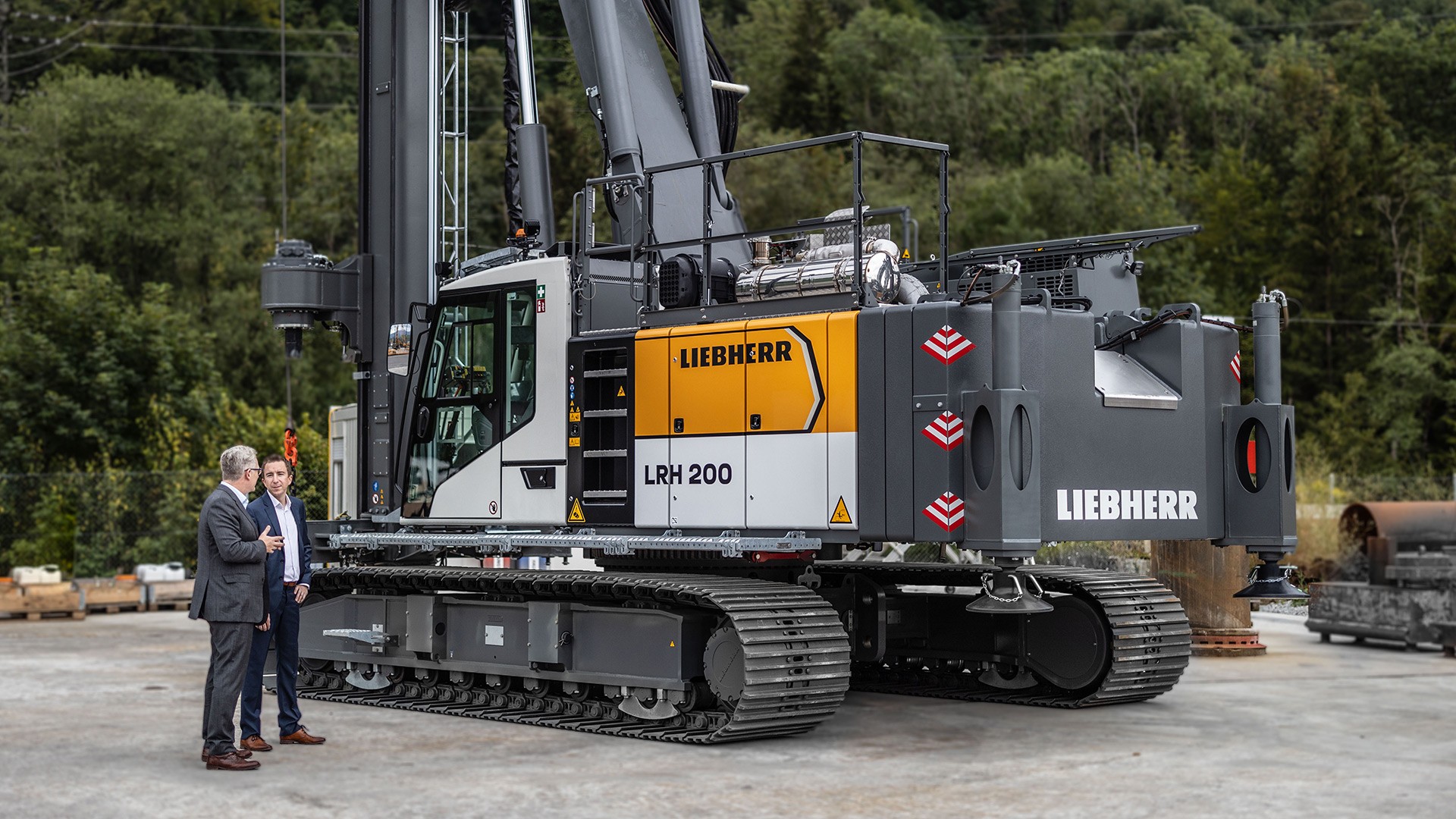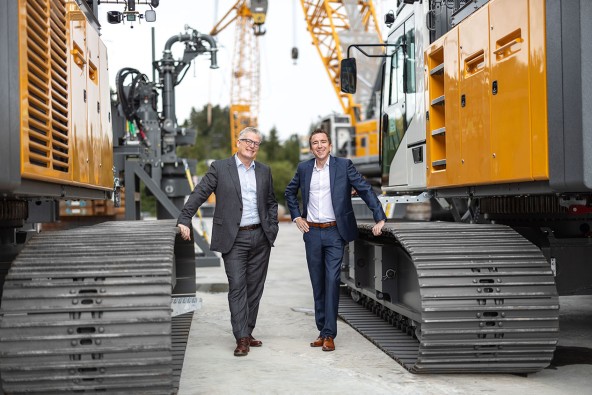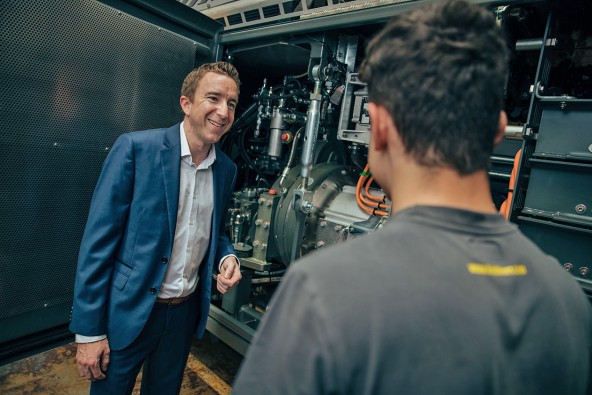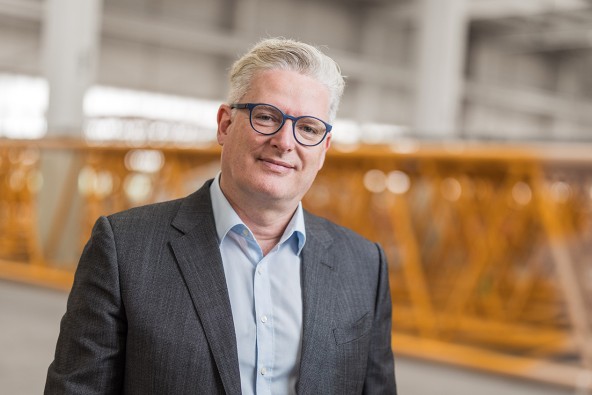
Striking the right tone
No exhaust fumes and only little noise on the construction site: More and more crawler cranes and deep foundation machines from Nenzing are being made available as unplugged versions. That means they can be used wirelessly with a battery – and that with the same power as with a conventional drive. Michael Flecker, head of sales crawler cranes, and Sascha Bechter, head of sales deep foundation machines and material handling equipment, know why both types of drive complement each other perfectly and why each has its own justification.
First unplugged model 2019
It might be said that Michael Flecker grew up with Liebherr crawler cranes. At the very least, they have had a massive influence on his professional life. He first came into contact with crawler cranes in 2005 when he started his career at Liebherr as an international fitter – and has remained loyal to them ever since. Since April 2022, the Vorarlberg native has been head of sales crawler cranes in Nenzing. Flecker has previously seen a lot of the world and was, among other things, customer service manager at Liebherr USA in Houston for several years. There he helped to build up the crawler crane segment and continuously developed it with feedback from customers. He was also up close when the first unplugged crawler cranes came onto the market at the end of 2020. The Liebherr unplugged machines were launched in 2019 with the LB 16 unplugged drilling rig – the world’s first battery-powered drilling rig. There are now a total of nine models coming from Nenzing that are also available as unplugged versions.

Sascha Bechter (left) and Michael Flecker (right)
“Demand for electric construction machines is particularly high among customers in northern Europe – led by the Scandinavian countries and Great Britain, which are pioneers in the field of zero emissions,” Flecker explains. In the meantime, Liebherr unplugged machines are available in many other countries, for instance Germany, France and the USA. Cities such as Oslo, for example, have clearly defined climate targets. By 2030, CO₂ emissions there are to be reduced by 95 per cent compared with 2009 levels. This means that as early as 2025, only emission-free construction machinery will be used in urban areas.
A clear advantage of the unplugged series is that the battery-powered units do not cause CO₂ emissions on the construction site. In addition, they are very quiet and therefore ideal for urban areas – an advantage for both residents and construction site workers. “Five unplugged machines are as loud as one diesel-powered machine,” Flecker explains. The battery-powered machines achieve the same performance as the diesel versions and are identical in their operation. Another advantage of Liebherr products is the complete package of drive concept and machine, because unlike its competitors, Liebherr offers both from a single source.
Five unplugged machines are as loud as one diesel-powered machine.

Michael Flecker, head of sales crawler cranes
The unplugged series also strikes the right tone with new customers. “Many customers choose our battery-powered machines because they believe in the technology and want to be the first to use it in their market,” explains Flecker. “In some countries, this is actually a distinct competitive advantage.”
However, even though unplugged construction machines have many advantages, they are not best suited for every use or application. That’s why all unplugged units in Nenzing remain available with conventional drives. “Together with the customer, we decide individually which drive technology is right for the customer, the construction site and the application,” adds Sascha Bechter, head of sales deep foundation machines and material handling equipment. The 48-year-old is a true Liebherr veteran. He started his career at Liebherr more than 30 years ago as an operational electrician in Nenzing, before being drawn to Liebherr’s international companies for many years. Whether in the USA, Great Britain, Italy or Singapore: “I have never worked for any company other than Liebherr,” says Bechter.
Together with the customer, we decide individually which drive technology is right for the customer, the construction site and the application.

Sascha Bechter, head of sales deep foundation machines and material handling equipment
That’s why he knows Liebherr construction machines and their applications in the field particularly well – and can judge which drive type suits which customer. Construction sites in rural or remote areas, for example, are typical applications where conventional drives are more suitable. This is because these places do not usually have the infrastructure needed for electric machines. Diesel-powered machines are sometimes also more suitable in the early stages of a construction project or for short-term assignments, because the necessary charging infrastructure for the electric motors is often not available when a construction site is first set up.
Flecker and Bechter agree that all types of drive have their justification. That’s why Liebherr takes an approach that is open to technology, where every customer gets what is best suited to them and their construction site.
Michael Flecker and Sascha Bechter tell us in the video how the conventional drives and the unplugged units complement each other.
By clicking on “ACCEPT”, you consent to the data transmission to Google for this video pursuant to Art. 6 para. 1 point a GDPR. If you do not want to consent to each YouTube video individually in the future and want to be able to load them without this blocker, you can also select “Always accept YouTube videos” and thus also consent to the respectively associated data transmissions to Google for all other YouTube videos that you will access on our website in the future.
You can withdraw given consents at any time with effect for the future and thus prevent the further transmission of your data by deselecting the respective service under “Miscellaneous services (optional)” in the settings (later also accessible via the “Privacy Settings” in the footer of our website).
For further information, please refer to our Data Protection Declaration and the Google Privacy Policy.*Google Ireland Limited, Gordon House, Barrow Street, Dublin 4, Ireland; parent company: Google LLC, 1600 Amphitheatre Parkway, Mountain View, CA 94043, USA** Note: The data transfer to the USA associated with the data transmission to Google takes place on the basis of the European Commission’s adequacy decision of 10 July 2023 (EU-U.S. Data Privacy Framework).
